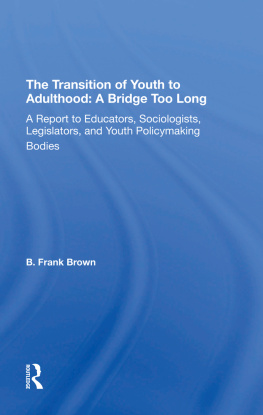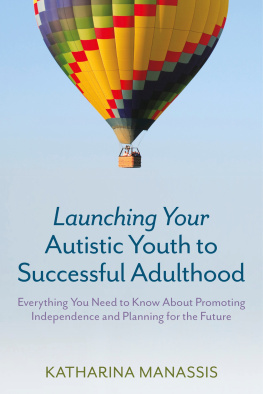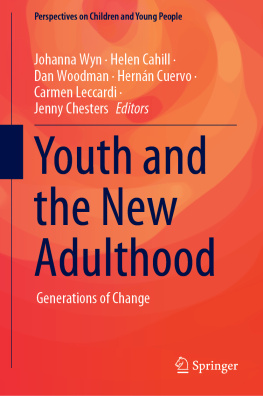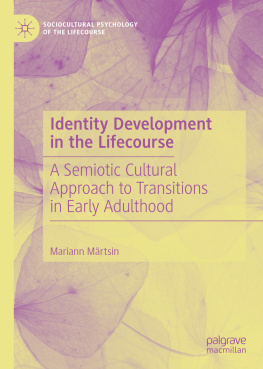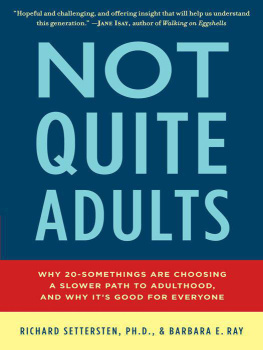Falling Back
Critical Issues in Crime and Society
Raymond J. Michalowski, Series Editor
Critical Issues in Crime and Society is oriented toward critical analysis of contemporary problems in crime and justice. The series is open to a broad range of topics including specific types of crime, wrongful behavior by economically or politically powerful actors, controversies over justice system practices, and issues related to the intersection of identity, crime, and justice. It is committed to offering thoughtful works that will be accessible to scholars and professional criminologists, general readers, and students.
For a list of titles in the series, see the last page of the book.
Falling Back
Incarceration and Transitions to Adulthood among Urban Youth
Jamie J. Fader
Rutgers University Press
New Brunswick, New Jersey, and London
LIBRARY OF CONGRESS CATALOGING-IN-PUBLICATION DATA
Fader, Jamie J.
Falling back : incarceration and transitions to adulthood among urban youth / Jamie J. Fader.
p. cm.(Critical issues in crime and society)
Includes bibliographical references.
ISBN 9780813560748 (hardcover : alk. paper)-ISBN 9780813560731 (pbk. : alk. paper)-ISBN 978-0-8135-6075-5 (e-book)
1. Juvenile delinquentsPennsylvaniaPhiladelphia. 2. Juvenile delinquentsRehabilitationPennsylvaniaPhiladelphia. 3. Juvenile correctionsPennsylvaniaPhiladelphia. 4. Juvenile justice, Administration ofPennsylvaniaPhiladelphia. 5. Mountain Ridge Academy. I. Title.
HV9106.P5F33 2013
365.'420974811dc232012033333
A British Cataloging-in-Publication record for this book is available from the British Library.
Copyright 2013 by Jamie J. Fader
All rights reserved
No part of this book may be reproduced or utilized in any form or by any means, electronic or mechanical, or by any information storage and retrieval system, without written permission from the publisher. Please contact Rutgers University Press, 106 Somerset Street, New Brunswick, NJ 08901. The only exception to this prohibition is fair use as defined by U.S. copyright law.
Visit our website: http://rutgerspress.rutgers.edu
Manufactured in the United States of America
To my dad, James Frederick Fader
This is a terrible hardened one, they says to prison wisitors, picking out me. May be said to live in jails, this boy. Then they looked at me, and I looked at them, and they measured my head, some on em,they had better a measured my stomachand others on em giv me tracts what I couldnt read, and made me speeches what I couldnt understand. They always went on agen me about the Devil. But what the Devil was I to do? I must put something in my stomach mustnt I? Tramping, begging, thieving, working sometimes when I coulda bit of a poacher, a bit of a labourer, a bit of a wagoner, a bit of a haymaker, a bit of a hawker, a bit of most things that dont pay and lead to trouble, I got to be a man.
Magwitch, in Charles Dickenss Great Expectations (1861)
Contents
Above all, we do not have enough studies in which the person doing the research has achieved close contact with those he studies, so that he can become aware of the complex and manifold character of the deviant activity.
Howard Becker, The Outsiders
WHEN I STARTED A Ph.D. program at the University of Pennsylvania, I had no reason to suspect that I would become an inner-city godmother, drive a getaway car after my companion provoked a high school basketball team to form an angry lynch mob, deliver a group of pallbearers to an eighteen-year-olds funeral, or take an overnight road trip with several former and active drug dealers. I could never have predicted that my SUV would be used as an ambulance for a young woman who believed she was losing her baby, or that I would be asked to hang out while my companion provided a urine sample for his probation officer. I could not imagine hearing that a young man had been shot to death on the very street corner where I had stood with him only five days earlier.
I did know that, after six years of crunching numbers to evaluate delinquency programs, I wanted to understand the experience of juvenile justice from the perspectives of the young people inside the system. Researchers so rarely ask youth to share their insights, perhaps because we dismiss them as inarticulate or immature or because we worry that they might hesitate to make themselves vulnerable to strangers, particularly white, middle-class ones. Scholars have not always kept such distance from their subjects. In the early twentieth century, sociology students were regularly encouraged to leave the college campus to conduct in-depth community studies and collect life histories of gang members and other delinquent youth. Robert E. Park, a former journalist and founder of the Chicago School of Sociology, famously exhorted, Go and sit in the lounges of luxury hotels and on the doorsteps of the flophouses; sit on the Gold Coast settees and on the slum shakedowns; sit in the Orchestra Hall and in the Star and Garter Burlesque. In short, gentlemen, go and get the seat of your pants dirty in real research. These gems convinced me that, by talking to young people, I could gain valuable knowledge about the ebb and flow of criminal careers among adolescents at the cusp of young adulthood.
I OWE SPECIAL DEBTS to several mentors who had a hand in crafting this book. I am grateful for the mentorship and guidance provided by Elijah Anderson, Kathryn Edin, Lawrence Sherman, David Bayley, Hans Toch, and Michael B. Katz. Without institutional support from the University of Pennsylvania Graduate School of Arts and Sciences, the Otto and Gertrude K. Pollak Summer Research Fellowship, and the Ford Foundation Diversity Fellowship, this work could never have been completed. My research would have been impossible without the permission of and encouragement from Joyce Burrell at Philadelphias Department of Human Services, Judge Myrna Field at Philadelphias Family Court, and the administrators and staff at the institution I call Mountain Ridge Academy.
Several other scholars have provided me with ideas, support, and feedback along the way, including Patrick Carr, Randall Collins, Jeff Ferrell, Frank Furstenberg, David Grazian, Paul Hirschfield, John Laub, Robin Leidner, Shadd Maruna, Mary Poulin, Stephen Richards, Eric Schneider, and Tukufu Zuberi. Thanks also to Peter Mickulaus at Rutgers University Press; Grey Osterud, who provided much-needed editorial guidance during the revision of this manuscript; Kate Babbitt and Joseph Dahm, who assisted with copyediting; and Jeane Miller, who developed maps for the section on racial segregation in Philadelphia.
My colleagues in graduate school and beyond generously offered moral support at times of stress and doubt: Faye Allard, Rene Luis Alvarez, Bob Apel, Janel Benson, Keith Brown, Rachelle Brunn, Gniesha Dinwiddie, Marie Garcia, Alice Goffman, Jaime Henderson, Megan Kurlychek, Ke Liang, Catherine Mayer, Dana Peterson, Allison Redlich, Meredith Rossner, Janet Stamatel, Lindsay Taggart-Rutherford, and Wendy Thompson.
I owe a great debt to my real and extended families, including my Philadelphia dad, Phil Harris, and his wife, Ellen. Thanks, too, to the Fountain, Kelly, and Park clans, who have offered constant encouragement and important diversions from writing. Paul Gordon, my former husband, supported both my research and my return to graduate school. Thank you to my lifelong friends, Rachael Bennett, Greg Diltz, Shannon Hurley, the late Michael Kupe Kuperman, and Susan Rochard, for being a constant presence in my life no matter how far away I move. My parents, James Fader and the late Nancy Allen Fader, pushed me to excel and refused to accept any limits on what I could become. I thank my dad for his support, even though I know he doesnt understand why I want to hang out with people who break the law. I am grateful to my mother for passing on her spontaneity and fire. My husband, Chris Kit Kelly, came into my life unexpectedly and changed it forever. He is my spiritual and intellectual partner and my most supportive critic.


